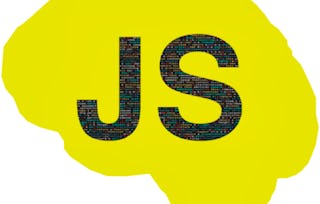This is the first course in a sequence of four courses that develops essential 21st century computational thinking (CT) skills using the popular JavaScript language as a vehicle.

Computational Thinking with Javascript 1: Draw & Animate

Computational Thinking with Javascript 1: Draw & Animate
This course is part of Computational Thinking with JavaScript Specialization


Instructors: Quintin Cutts
2,114 already enrolled
Included with
Recommended experience
What you'll learn
A key problem solving framework to use new technologies in any problem domain.
Experience using the framework with Javascript and animated graphics.
Skills you'll gain
Details to know

Add to your LinkedIn profile
See how employees at top companies are mastering in-demand skills

Build your subject-matter expertise
- Learn new concepts from industry experts
- Gain a foundational understanding of a subject or tool
- Develop job-relevant skills with hands-on projects
- Earn a shareable career certificate

There are 4 modules in this course
This module introduces the instructors for this course and for the longer Computational Thinking with Javascript specialisation. A framework for understanding computational thinking is introduced and first steps are taken with Javascript, applying it in the context of simple graphics - drawing and animation.
What's included
8 videos8 readings5 assignments3 discussion prompts
In this module, you take the foundations you have learned about computational thinking, some early programming constructs, and your program reading skills, and you start to learn about writing programs for tasks.
What's included
2 videos7 readings1 assignment1 peer review4 discussion prompts6 ungraded labs
As our drawings become more complex, their descriptions will quickly become unwieldy. To counter this, we introduce programming language constructs that allow highly complex drawings to be described in just a few lines. They're a bit harder to understand at first, but in the long term, they're essential.
What's included
3 videos6 readings1 assignment5 ungraded labs
Drawing still pictures is one thing - but the process-oriented element of programming lends itself to animation - an activity taking place over time. In this module, we'll make use of all we've learned so far to create animations. Functions will be used in a new and important way - as a so-called "callback" - which form the foundation of interactive programming as we'll see in Course 3 of the specialisation.
What's included
2 videos5 readings1 assignment1 peer review2 discussion prompts5 ungraded labs
Earn a career certificate
Add this credential to your LinkedIn profile, resume, or CV. Share it on social media and in your performance review.
Offered by
Explore more from Software Development
 Status: Free Trial
Status: Free TrialUniversity of Glasgow
 Status: Free Trial
Status: Free TrialUniversity of Glasgow
 Status: Free Trial
Status: Free TrialUniversity of Glasgow
 Status: Free Trial
Status: Free TrialUniversity of Glasgow
Why people choose Coursera for their career

Felipe M.

Jennifer J.

Larry W.

Chaitanya A.

Open new doors with Coursera Plus
Unlimited access to 10,000+ world-class courses, hands-on projects, and job-ready certificate programs - all included in your subscription
Advance your career with an online degree
Earn a degree from world-class universities - 100% online
Join over 3,400 global companies that choose Coursera for Business
Upskill your employees to excel in the digital economy
Frequently asked questions
If you are not confident with the skills you have, then this course, or rather this whole specialisation, will help cement foundational understanding and skills. Programming courses on the web often skim the surface, letting you see code and enabling you to put blocks of it together to achieve some outcome that the course designers set. But they don't necessarily help build your understanding of that code, and without it, you won't have the confidence to develop your own programs. In this course, we aim to give you the skills to properly understand the code constructs and larger fragments that we introduce, and that you will start to develop yourself. Simply getting a program working here is not the main aim - the goal is that you understand anything you create deeply, and that you are able to read and understand the creations of others, so that you can incorporate the releveant parts of their work, suitably adjusted, into your own. This is computational thinking - the ability to confidently address programming problems and come up with creative, well-crafted, solutions.
To access the course materials, assignments and to earn a Certificate, you will need to purchase the Certificate experience when you enroll in a course. You can try a Free Trial instead, or apply for Financial Aid. The course may offer 'Full Course, No Certificate' instead. This option lets you see all course materials, submit required assessments, and get a final grade. This also means that you will not be able to purchase a Certificate experience.
When you enroll in the course, you get access to all of the courses in the Specialization, and you earn a certificate when you complete the work. Your electronic Certificate will be added to your Accomplishments page - from there, you can print your Certificate or add it to your LinkedIn profile.
More questions
Financial aid available,
¹ Some assignments in this course are AI-graded. For these assignments, your data will be used in accordance with Coursera's Privacy Notice.

